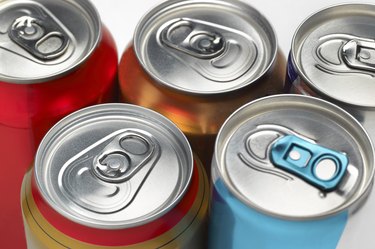
If you enjoy even the occasional can of Monster, you need to be aware of the dangers of too many energy drinks. The high concentration of caffeine and other stimulants can cause a host of health problems.
Tip
Too many Monster Energy drinks can cause health problems including increased blood pressure, irregular heartbeat and mental health issues.
Video of the Day
What's in Monster Energy?
Monster Energy offers an extensive line of products, including Java Monster, Juice Monster, original and sugar-free versions. Each of these types comes in several different flavors as well. While every Monster Energy drink includes different ingredients, there are many similarities between all of them, including lots of caffeine.
Video of the Day
For example, the USDA reports that the original Monster Energy has 164 milligrams of caffeine in each 16-ounce can. For comparison sake, the average eight-ounce cup of coffee has about 96 milligrams of caffeine. While this may not seem like Monster Energy has too much caffeine, there's more to these drinks than meet the eye.
Read More: The Best and Worst Energy Drinks
Energy drink companies do not face regulation from the USDA. Furthermore, the Food and Drug Administration classifies energy drinks as dietary supplements. As such, they do not have to adhere to the same standards as soda, coffee and tea. Because of the lax oversight, energy drinks like Monster Energy can contain more caffeine than they advertise, if they even say how much is in each can.
In addition to caffeine, energy drinks sometimes contain stimulants such as guarana extract, taurine, sugar and B vitamins. The additional stimulants in these drinks make it more dangerous to have too many energy drinks. If you consume Monsters several times a day or for too long, you may notice adverse effects.
Read More: How to Flush the Body of Caffeine
Negative Effects of Energy Drinks
The American College of Cardiology warns of the following effects of energy drinks on the body in the short term:
- Increased blood pressure
- Elevated heart rate
- Irregular heartbeats
- Aortic dissection
- Sudden cardiac death
The long term side effects of energy drinks on the cardiac system include hypertensive heart disease, coronary artery disease and atherosclerosis. In addition to the problems with the heart, the ones with high sugar content may cause weight gain. While weight gain isn't necessarily bad for your health, you may want to watch your intake if you are trying to lose or maintain your weight.
The Cleveland Clinic reports that the use of energy drinks can cause intense headaches as a result of reversible cerebral vasoconstriction syndrome (RCVS). The headaches that RCVS causes are often the worst a patient has ever had and they come on suddenly. These drinks may also cause strokes and brain hemorrhages, often in young adults.
Enjoy Healthy Alternatives
If you rely on Monster Energy for a quick pick-me-up during the day, you might feel worried about the side effects of energy drinks on the brain and heart. Luckily, you have options other than just being tired. Perhaps the healthiest alternative to energy drinks is getting adequate sleep.
The Centers for Disease Control and Prevention recommends the following amounts of daily sleep for each age range:
- 6 to 12 years: 10 to 13 hours
- 13 to 18 years: Eight to 10 hours
- 19 to 60 years: Seven or more hours per night
- 61 to 65 years: Seven to nine hours
- 65 years and older: Seven to eight hours
If you get enough sleep and continue to feel tired, see your doctor. If you simply do not catch enough Zs one night, try healthier and better-regulated sources of energy such as cinnamon, prunes and kombucha. Even caffeinated beverages like tea and coffee may be safer because of the increased regulation.
- USDA: "Monster Energy Drink"
- USDA: "Coffee, Brewed"
- Sutter Health: "Risks of Energy Drinks"
- FDA: "Spilling the Beans: How Much Caffeine is Too Much?"
- Hospital Pharmacy: "Energy Drinks: Food, Dietary Supplement, or Drug?"
- University of Michigan Medicine: "Energy and Sports Drinks"
- American College of Cardiology: "Stimulant-Containing Energy Drinks"
- Cleveland Clinic: "Warning: Are You Aware That Energy Drinks Can Trigger Strokes?"
- Centers for Disease Control and Prevention: "How Much Sleep Do I Need?"